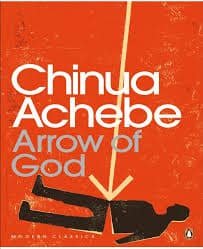
Chinua Achebe, one of Africa’s greatest literary icons, has penned remarkable works that capture the essence of African culture and colonial impacts. Among his most profound contributions is the novel Arrow of God. This novel, often regarded as a cornerstone of African literature, delves into themes of tradition, colonialism, and personal conflict.
In this article, we explore the intricate world Achebe creates in Arrow of God, offering a comprehensive analysis of its characters, themes, and relevance in today’s world.
Overview of Arrow of God
Arrow of God is the third novel in Chinua Achebe’s African Trilogy, following Things Fall Apart and No Longer at Ease. Published in 1964, it continues Achebe’s exploration of the Igbo society’s confrontation with British colonial rule. Set in the 1920s, the novel is centered around Ezeulu, the chief priest of Ulu, a god of the Umuaro community.
The narrative paints a vivid picture of the tension between traditional authority and the encroaching colonial government. Ezeulu’s struggles with his own people and the British administration symbolize the broader conflict between indigenous cultures and foreign influence. Achebe’s rich storytelling weaves historical realism with a compelling plot that remains relevant today.
Themes in Arrow of God
1. Tradition vs. Change
One of the central themes of Arrow of God is the clash between tradition and change. Ezeulu represents the old ways, serving as the custodian of customs and religious practices. However, the spread of Christianity and British colonial policies challenge the foundations of Igbo society.
Achebe illustrates how rigid adherence to tradition can lead to isolation and downfall. Ezeulu’s refusal to compromise ultimately results in tragedy. His failure to adapt reflects the broader struggle of African societies resisting colonial transformation.
2. Power and Authority
The novel delves deeply into the dynamics of power. Ezeulu’s position as the chief priest grants him significant influence. However, his authority is contested both within his family and by colonial authorities. Achebe expertly portrays how power can become a burden, leading to personal and communal conflict.
3. Colonialism and Its Impact
The effects of British colonialism are omnipresent in Arrow of God. The novel examines how colonial forces disrupt traditional governance and spiritual beliefs. Captain Winterbottom, representing the British administration, embodies the colonial arrogance that undermines indigenous systems.
Achebe’s depiction of colonial impact goes beyond political domination, highlighting the psychological and cultural disintegration faced by colonized societies.
Character Analysis
Ezeulu
Ezeulu is the complex protagonist of Arrow of God. As the chief priest of Ulu, he is torn between his duties to tradition and the pressures of change. His stubbornness and pride are both his strengths and his downfall. Achebe crafts Ezeulu as a tragic hero whose internal conflicts mirror the external struggles of his community.
Captain Winterbottom
Winterbottom represents the British colonial power in the novel. His interactions with the Igbo people reveal the condescension and paternalism of the colonial mindset. His character adds depth to Achebe’s critique of imperialism.
Obika and Oduche
Ezeulu’s sons, Obika and Oduche, embody the generational divide within the story. Obika is impulsive and proud, while Oduche embraces Christianity and Western values. Their contrasting paths illustrate the tensions between tradition and modernity.
Symbolism in Arrow of God
Achebe employs rich symbolism to enhance the novel’s themes. The title itself, Arrow of God, represents divine will and fate. Ezeulu’s role as the arrow of Ulu signifies his position as both a servant and a tool of higher powers. The yam, a staple crop, symbolizes sustenance and survival, further emphasizing the novel’s connection to cultural heritage.
Comparison with Other Works
Readers familiar with Achebe’s earlier novels will find thematic parallels in Arrow of God. In No Longer at Ease, Achebe explores the personal and societal conflicts faced by Obi Okonkwo, a descendant of the protagonist from Things Fall Apart. Similarly, The Lion and the Jewel by Wole Soyinka examines the tension between tradition and modernity in Nigerian society. Chimamanda Ngozi Adichie’s Half of a Yellow Sun offers a more contemporary perspective on cultural identity and the Nigerian state.
Relevance of Arrow of God Today
Despite being published over five decades ago, Arrow of God remains profoundly relevant. The themes of cultural erosion, identity, and resistance resonate in modern discussions about globalization and cultural preservation. Achebe’s exploration of leadership, power, and pride provides timeless lessons about governance and human nature.
Conclusion
Arrow of God by Chinua Achebe is a literary masterpiece that captures the complexities of African society under colonial rule. Its rich characters, compelling themes, and symbolic depth make it a must-read for anyone interested in understanding the cultural and historical dynamics of Nigeria. As we reflect on Achebe’s legacy, it becomes clear that his works are not just stories but vital commentaries on the human experience.
For further reading, explore Achebe’s No Longer at Ease, Wole Soyinka’s The Lion and the Jewel, and Chimamanda Ngozi Adichie’s Half of a Yellow Sun. These works, like Arrow of God, offer invaluable insights into the complexities of African literature and post-colonial identity.

Leave a Reply
You must be logged in to post a comment.